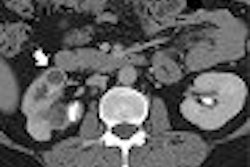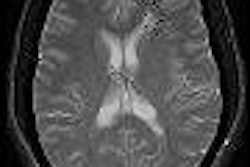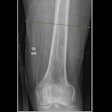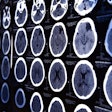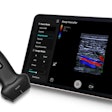
When thousands of athletes parade into Olympic Stadium tonight to open the 28th Summer Olympiad, the ceremony will be both a grand spectacle and a welcome opportunity to set aside security concerns as a major topic of conversation.
Not that the security itself will disappear; it will remain a pervasive presence right through the closing ceremony on August 30. But the usual media frenzy preceding the competition has brought a nearly obsessive concern over whether Greece would be an inviting target for terrorists.
On the positive side, those concerns have been answered with an impressive influx of security technology and expertise from around the world -- much of it with a familiar ring for those working in radiological sciences.
Global focus
In addition to receiving advice, training, and intelligence from at least seven countries (Great Britain, France, Germany, Spain, Australia, Israel, and the U.S.), Greece is also working closely with the European Union and the North Atlantic Treaty Organization.
NATO surveillance aircraft will hover above Greece for the duration of the games, keeping watch over more than 70,000 police officers and members of the Greek Army and Coast Guard. On the ground, security officials are aided by hundreds of security cameras and other technology.
"In a post-September-11 world, we have accorded Olympic security the highest priority," said Achilles Paparsenos, a spokesman for the Embassy of Greece in Washington, DC. "We have committed unprecedented resources and managed an unprecedented level of international cooperation."
About $350 million of the estimated $1.5 billion being spent on security has gone to San Diego-based Science Applications International Corporation (SAIC), which also handled security at the 2002 Winter Olympics in Salt Lake City. Building on its 2002 experience, SAIC is overseeing implementation of what it metaphorically describes as an "electronic fence" around the Athens games.
Most of the details regarding security have been deliberately shrouded in secrecy. But as the games approached, officials revealed more specifics about their capabilities -- perhaps in an effort to reassure attendees and dissuade would-be terrorists.
$7 million x-ray scanners
If intelligence is the first line of defense against terrorism, imaging technology is one of the last -- a way for military and security personnel to investigate not just people, but buildings, packages, and vehicles that might hide explosives or guns.
The highlight of the Olympics armamentarium is a pair of mobile x-ray scanners costing about $7 million apiece, loaned to Greek officials by the U.S. Customs and Border Protection agency.
Mounted on command vehicles and featuring an extending arm, these machines allow operators to scan the interior of a standard 40-foot cargo container in less than a minute. They will be used at ports around Athens, and to screen trucks and other vehicles headed for Olympics sites around the city.
In addition, the U.S. Department of Energy has donated radiation detectors valued at more than $26 million to help Greece detect any so-called "dirty" bombs -- conventional explosives that have been tainted with radioactive materials.
Some 32 permanent radiation detectors will reportedly be installed at Greece's airports, seaports, and Olympic venues. Greek police, border guards, and other security officials will be given portable detectors. The Greek government has also increased the protection systems at sites where radioactive materials could be accessed, including 22 hospitals and clinics.
In addition, the American College of Radiology (ACR) has provided its 40-page primer, "Disaster Preparedness for Radiology Professionals: Response to Radiological Terrorism," to Greek officials as a resource, according to an ACR spokesman.
Largely ignored in the media coverage of dirty bombs, however, is the question of how much physical -- as opposed to psychological -- harm could actually be caused by a crude device of this kind.
In a recent opinion piece, Richard Muller, Ph.D., professor of physics at the University of California, Berkeley, suggests that any deaths from a dirty bomb would come not from radioactivity, but from automobile drivers fleeing in unnecessary panic.
The Wall Street Journal also reported that radiation detectors deployed in U.S. shopping malls and other locations have succeeded mostly in singling out recent radiotherapy and nuclear medicine patients.
Plans in place
By luck or design, the physician overseeing the Olympic Polyclinic medical facilities for the Athens games -- who was selected long before September 11 -- is also a member of the World Association for Disaster and Emergency Medicine. Orthopedic surgeon Dr. Demetrios Pyrros completed his master's degree in disaster medicine and has practiced in various countries as a co-founder of the Greek chapter of Médicins Sans Frontières, or Doctors Without Borders. But like others on the Athens Organizing Committee, he prefers not to dwell on any plans for an extraordinary occurrence.
"We have clearly collaborated with the government of Greece, which will be handling any such case," Pyrros said in an interview with AuntMinnie.com. "I would like to leave it at that."
"We don't want to reveal everything," said Greek embassy spokesman Paparsenos, "but we have prepared for everything. Even the most asymmetrical threat has been accounted for."
And if all that security doesn't make Athens sound like a great vacation spot, Paparsenos maintains that Greece "will not be a police state, not an armed camp. But we do want people to be as safe as possible."
By Matt King
AuntMinnie.com contributing writer
August 13, 2004
Related Reading
Olympics security: Fighter jets, special forces, imaging and more, February 8, 2002
Colombia buys Wuestec DR for contraband screening, November 21, 2001
Imaging technology answers an urgent call for security, October 26, 2001
Copyright © 2004 AuntMinnie.com





